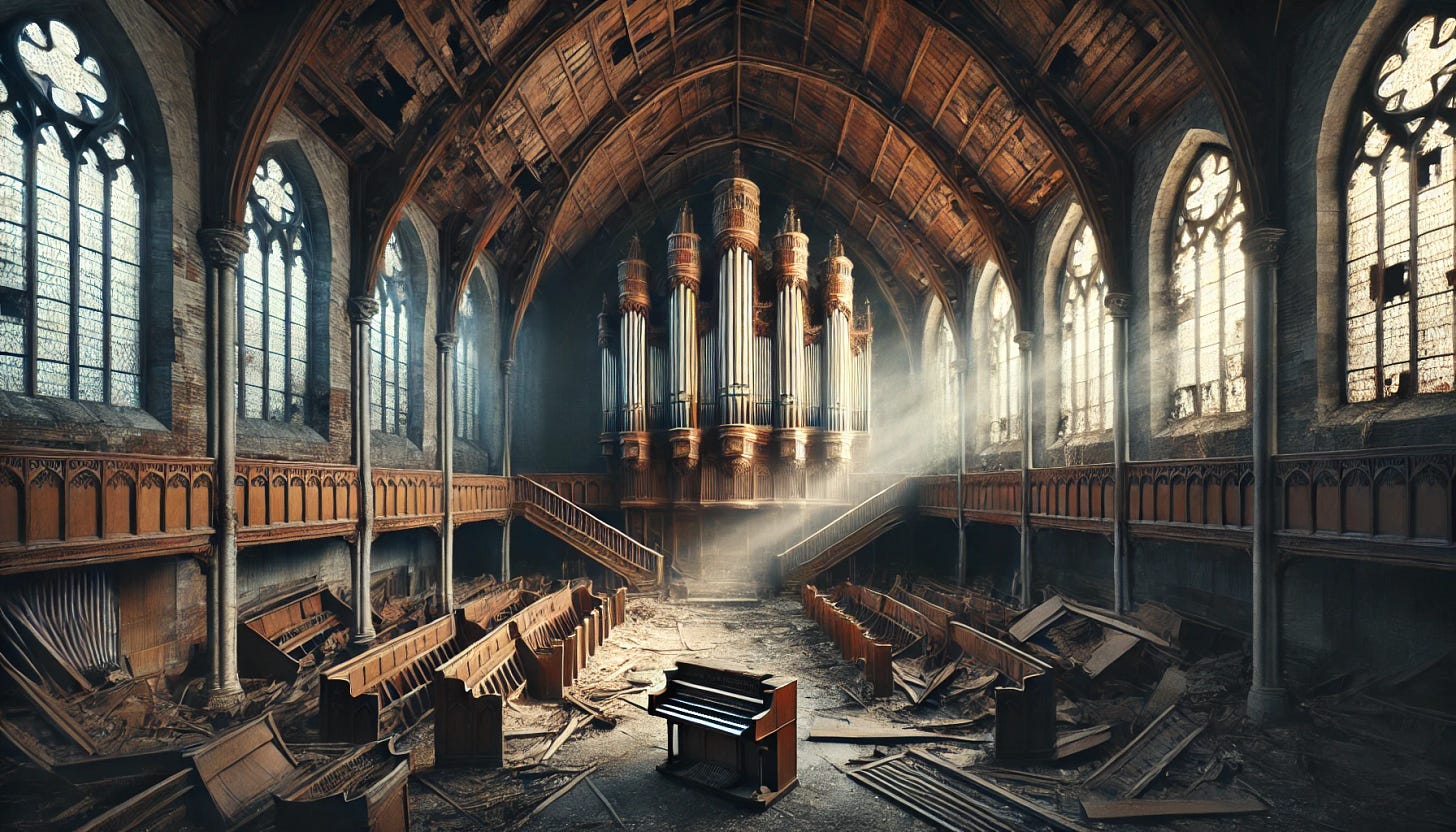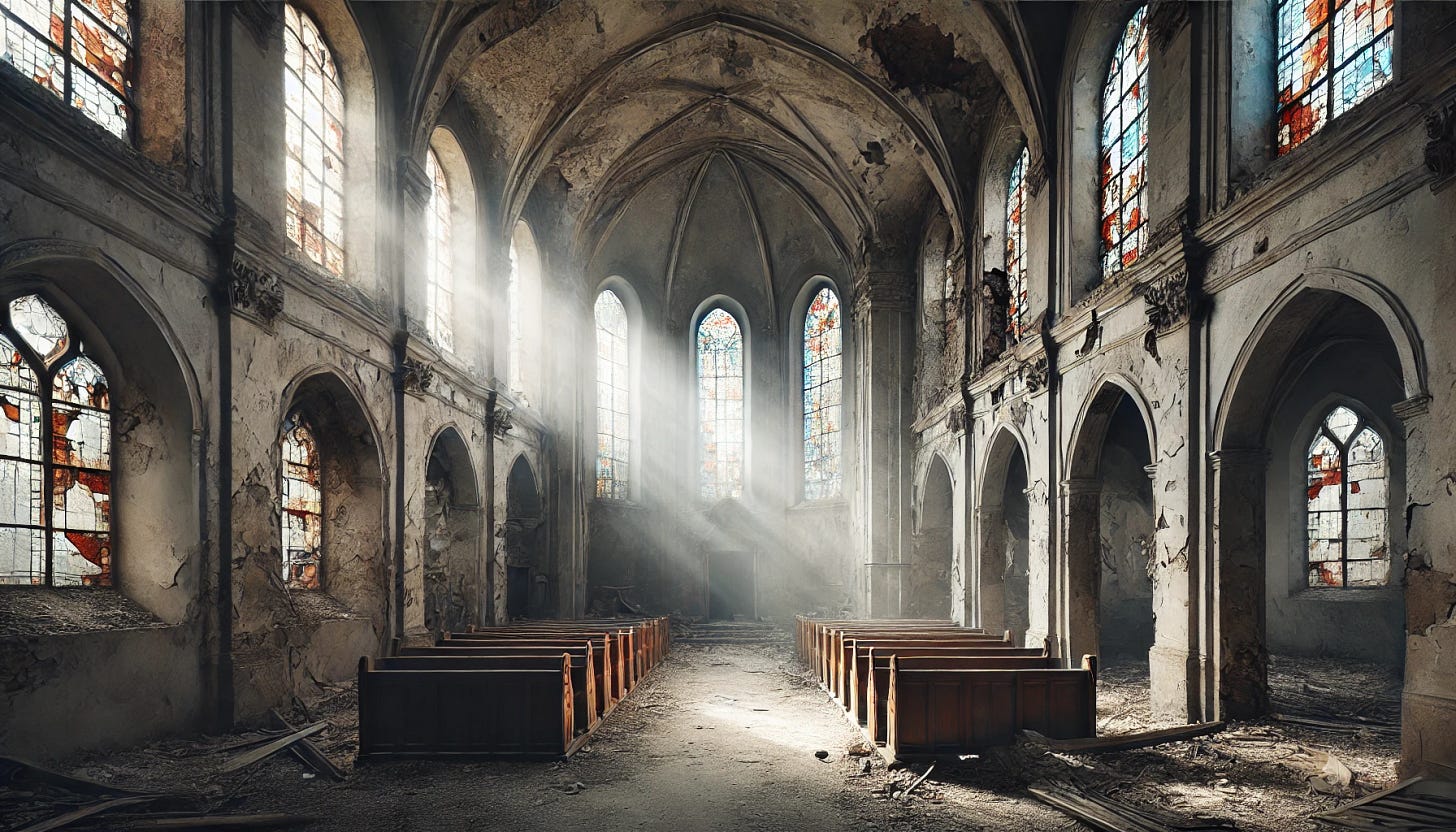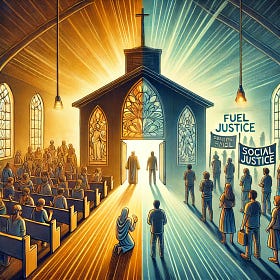A few months ago, I attended a gathering of Mainline Protestant pastors. As is often true of such gatherings, there was a mix of theological and ideological perspectives in the room, though the dominant voices leaned heavily Progressive. During introductions, one pastor from a particularly Progressive denominational church stood up, shared their story, and acknowledged that their congregation was coming to terms with its own demise. They explained that their church had concluded that the only "faithful" thing to do was to give away all its resources to nonprofits and close their doors for good.
Hearing this, I was saddened but hardly surprised. It’s a story I’ve heard repeatedly in recent years as the Mainline church continues to enter what many have described as a death spiral—well-documented by thinkers like Dwight Zscheile and Ben Crosby, both noting how due to denominational decline, their respective denominations, the Evangelical Lutheran Church in America and the Episcopal Church, will both crater to nearly zero by 2040. Yet, in spite of these dire warnings, there seems to be a malaise across Mainline Protestantism, something Crosby laments in his piece, saying that “the broader institutions of the church seem[s] blissfully unconcerned with this crisis.” I understand Crosby’s frustration, as I’ve even had a seminary professor and pastor admit to me outright that a church closing “wasn’t really that big of a deal.” But this is where I draw the line.
It’s become increasingly clear to me that the ultimate ideological conclusion of Progressive Christianity is that the church itself must end. Its history is deemed irredeemably corrupt, its resources seen as tainted and better spent elsewhere, and its purpose and future regarded as too opaque to justify its continued existence.
In his new book, In The Church in Dark Times, Mike Cosper offers a profound examination of how systemic evil can infiltrate and corrupt evangelical churches, often through ordinary people with good intentions. Cosper, most known for his podcast The Rise and Fall of Mars Hill, focuses on the evangelical church. Drawing on political theorist Hannah Arendt’s concept of the “banality of evil,” Cosper highlights the ways in which thoughtless adherence to systems, structures, and ideologies can lead to complicity in harm. He emphasizes the danger of following ideology at all costs, where rigid beliefs and blind allegiance to leaders or doctrines erode critical thinking and allow abuse and corruption to flourish.
Cosper challenges readers to confront these realities, urging churches to resist the allure of unchecked power and the subtle normalization of harmful behaviors. He calls believers to embrace communal practices like worship, storytelling, and fostering genuine relationships as a means of rebuilding trust and integrity. By moving beyond ideology and prioritizing human connection, churches can navigate the darkness with courage and hope.
While Cosper’s focus is primarily on the Evangelical church, I couldn’t help but read his work through the lens of my own current context within Mainline Protestantism, where Progressive ideology has run amok, displacing and replacing any sort of biblical or historically Christian theology. To be clear, this is NOT a desire to return to some form of fundamentalism that condemns LGBTQ+ persons or subjugates women. This is not about seeking to restore seven-day creationism or biblical inerrancy. This is about building a case for welcome and inclusion FROM scripture and tradition rather than in spite of it. This is about why the church and the Christian faith matter.
These Four Reflections Will Guide My Thinking
The Rise of Progressive Ideology in Christian Churches
How has the growing influence of Progressive ideology reshaped the mission and identity of the church? What are the implications of replacing biblical theology with secular frameworks of thought?
The Church as "Unnecessary Overhead"
Has the emphasis on social justice and activism overshadowed the church’s distinctive role as a place of worship, spiritual formation, and community? What is lost when the church is seen as expendable?
The Sacredness of Church Spaces
Do church buildings possess an intrinsic holiness that goes beyond their functional or economic value? How might reclaiming their sacred significance reshape how we think about their purpose?
The Spiritual Significance of Worship and Prayer in Church.
What if gathering in corporate worship and prayer is not only transformative for individual faith but also essential for the collective vitality of the church? Could these practices serve as a countercultural witness to the sacred in an increasingly secular world?
The Rise of Progressive Ideology in Christian Churches
The tension between ideology and theology in the church raises an urgent question: what happens when the church becomes more focused on movements and agendas than on fostering genuine encounters with God? Recently I saw a discussion in a Mainline Protestant clergy social media group where a pastor asked the question about transitioning their church from primarily being a worshipping community to instead being a social advocacy organization that also worships, being something like a “food pantry that worships.” As backward as this might seem, it makes perfect sense in a context in which ideology (social welfare or social justice) is seen as more important than theology. And to be clear, this is not to say that social welfare or social justice programs are not important, rather my point is that the order is reversed. Quite clearly, ideology has become the driving factor.
Mike Cosper warns that “a church built on an ideology can provide a simulacrum of a spiritual experience. Being part of a movement will spike your adrenaline, stir powerful emotions, inspire ideas and fears and hopes. But of course, that isn’t the same thing as encountering the presence of God” (Cosper, 183). This poignant observation underscores a key issue: ideology, while it may ignite passion and rally people around a cause, often lacks the spiritual depth necessary to foster true transformation. Zscheile, Binder, and Pinkstaff echo this concern, noting, “Some churches have adopted identities shaped more by political and cultural tribalism than by the gospel. This may bring a certain kind of energy and engagement from some people, but it only confirms the worst suspicions unchurched neighbors have about how compromised the church has become. They don’t see Jesus in it” (Leading Faithful Innovation, 150). In these cases, the church loses its distinctiveness as a spiritual institution, becoming instead a vessel for political or cultural agendas.
The real problem with progressive ideology is its ability to masquerade as belief or theology. As Cosper explains, “As a logical framework, ideology takes the shape of a system of belief. It acts like a theology, providing a syntax and vocabulary for spiritual conversations. But it doesn’t teach you to pray” (Cosper, 182). Ideology may structure conversations and offer a sense of coherence, but it lacks the transformative power of true faith, which is cultivated through practices like prayer and worship.
This is not to dismiss the value of certain critical ideas. As Draper, Michele, and Mae observe, “Critical studies…help us name certain power structures as idolatry [but] does not sow the seeds of new life” (Disabling Leadership, 19). However, when ideology replaces theology, the church risks becoming disconnected from its spiritual core. Andrew Root highlights this danger, explaining that “modern theologies that concede to the immanent frame's planting of God in religion tend toward a theology without the church,” one that is “energized and animated entirely by human effort and action” (Churches and the Crisis of Decline, 90). In this framework, where resources are limited, human energy is finite, and social justice becomes the ultimate value, the church as a place of worship is reduced to unnecessary overhead.
The Church as "Unnecessary Overhead"
With such ideology in place, the church, along with all its rites and rituals, is often reduced to unnecessary overhead. Why pay a pastor when a community organizer or lobbyist can seemingly accomplish more tangible results? Why devote time to prayer and worship when the focus should be on marching in the streets or lobbying the halls of Congress? A few years ago, I was stunned to hear the news that a tenure-track professors from seminary was going to law school, seeking to make a bigger impact in the cause of social justice. Again, this makes perfect sense in the move from theology to ideology as the driving force.
In The Pastor in a Secular Age, Andrew Root highlights this shift, writing that “it is a short step between flourishing and an exclusively human flourishing that sees no need for the otherness of God's action” (124). Within the framework of Progressive Ideology, the Progressive Mainline church increasingly views human flourishing as entirely reliant on human action, relegating the church to the role of a political action committee. Tim Keller, as an outsider to the Mainline tradition, echoes this critique. In The Decline and Renewal of the American Church, he observes: “Instead the church was becoming a social service agency and political lobbying blog, performing functions that could be done far better by secular organizations. No wonder it was in decline. The Mainline church was increasingly offering people nothing that the secular culture and its institutions could not offer” (9).
The central problem with Progressive Ideology is that it redefines worship and the holy work of the church as unnecessary overhead—an inefficient use of resources on the human-driven march toward social justice. Jesse Zink recognizes this issue, noting, “For some Christians, mission and social transformation came to be synonymous. It became unclear what unique value the Christian gospel had to add” (Faithful, Creative, Hopeful, 179). Zink, like me, sees the logical endpoint of Progressive Ideology: the church itself becomes an obstacle. As he writes, “If what was important was working to build the kingdom of God in the world and not what was happening in the church, then perhaps the church could be sidelined or dispensed with altogether. Who needed its archaic traditions and outdated rites when there were so many pressing issues of justice to be working on? If it was the world that set the agenda and it seemed like the church was not supporting that agenda quickly or fully enough, then why not just leave behind the church altogether?” (emphasis added; Faithful, Creative, Hopeful, 178).
The Sacredness of Church Spaces
There is a pervasive, immanent, capitalistic assumption that church spaces must always be well-utilized to justify their existence. While I, too, am not a fan of worship spaces sitting empty six days a week, I must ask: what if these spaces, in and of themselves, are holy and sacred? What if, even when used only once or twice a week for sacred gatherings, they are already fulfilling their highest purpose—rather than needing to justify their existence through economic output or utility within a capitalistic framework? Recently, a story of a Lutheran Church in the upper Midwest trended about their plan to tear down their sanctuary and instead build affordable housing. The comments were predictable of course, to the effect of, “more churches should do this,” “It’s about time. Churches sitting on prime real estate,” "A building that sits empty most of the week isn’t serving anyone.”
This perspective aligns with the work of Charles Taylor, as interpreted by Andrew Root. Root describes the "immanent frame" as a mindset that forces us to think only in terms of practicality and efficiency. Within this framework, there is no inherent "sacredness." Things are valued solely for their contribution to society or their economic output. This mindset pushes churches to reconsider their buildings' worth in terms of social or material productivity, rather than as places set apart for worship and spiritual formation.
As a result, when Mainline congregations can no longer afford to maintain their buildings, these spaces are often reimagined as tools for social justice causes rather than continuing as houses of worship. Kristina Lizardy-Hajbi highlighted this in her interview on the Future Christian podcast, suggesting that Mainline churches should give their buildings to minority congregations, even if those congregations hold more conservative theological views than the original owners. Yet, because ideology often becomes the driving factor, many congregations prefer to give their buildings—or the proceeds from their sale—to social justice nonprofits rather than to Christian communities that may not align ideologically but are eager to use the space for worship, prayer, and discipleship. In such cases, the sacred loses out to the ideological.
Andrew Root captures this tension vividly: “There was no sense of a sacred time or space; the church building was as secular and utilitarian as any office complex. Rather than an invitation to enter into a sacred reality, it presented a place to find the resources to personally flourish (including childcare assistance, counseling centers, support groups, exercise classes, and coffee shops). Ironically, this would make the building essential, for it was the place that held the material resources and programs individuals needed to flourish” (The Pastor in a Secular Age, 21). This shift challenges us to reconsider whether the true value of sacred spaces lies in their utility or in their ability to draw us into a deeper connection with God and the divine. I would argue the latter.
The Spiritual Significance of Worship and Prayer in Church.
In many Progressive Christian spaces, the Sunday morning gathering has devolved into little more than a pep rally, offering inspiration without depth. It’s not too long ago that I remember attending a Mainline Protestant church where the Bible didn’t even get mentioned during a Sunday morning message. Recently I saw a social media post from a Mainline church promoting a NON-faith based youth group!
It’s gotten to the extent that the perpetual disdain for the Apostle Paul (putting aside questions of authorship of some epistles) within Progressive Christianity is old hat. It’s funny, ten or fifteen years ago, Progressive Christians were the ones saying, “you don’t have to be vote Republican to be a Christian”—now it’s essentially become “how can you be a Christian and not vote Democrat” as Progressive churches proudly flaunt their disdain for Trump and his supporters.
But Christian worship is meant to be so much more—it offers something transcendent, something that cannot be found in secular gatherings or personal self-help. Sunday worship provides an opportunity to encounter the sacred, a connection to the divine that reorients our lives and calls us into a deeper reality. As Tim Keller explains, “corporate worship liturgical practices, music, narrative, and art, and deep community are the vehicles that bring the doctrines of scripture into contact with the affections, commitments, and loves of the heart so they can be changed” (The Decline and Renewal of the American Church, 44).
This connection to the transcendent isn’t just about individual spirituality; it is about addressing the big questions of life and faith. J. Michael Jordan highlights this role of worship, stating, “Regular worship attendance is one of the very few routines that many people continue to have that are explicitly about the big things in life: meaning, repentance, renewal, reconciliation, death, resurrection. For many Christians, church is one of the few places where they dare to step away from the twenty-first-century project of curating the self to encounter something larger than themselves” (Worship in an Age of Anxiety, 229). Sunday morning worship creates a sacred pause, a moment where we stop striving and allow ourselves to be reshaped by God's presence.
This reshaping happens because worship shapes what we love. As Yolanda Norton insightfully observes, “because we are wired to worship, our habits shape what we love (or don’t love). We learn to love God and people through the practices that form how we love God and people” (Discipleship as Holy Collaboration, 33). Worship forms us in ways that extend far beyond the sanctuary. It shapes our hearts, aligns our desires with God's, and strengthens our ability to love our neighbors with grace and compassion.
Andrew Root expands on the unique role of the church in nurturing this spiritual formation: “The church, then, is not solely an institution seeking its own life. Rather, the church is a gathering place to receive the ministry of Jesus through the embrace of others. Embraced, those ministered to through their death experience are ordained and sent into the world to minister to their neighbors. The church has no life outside the receiving and giving of ministry. For without the dynamic of the receiving and giving of ministry, the church is absent Jesus Christ. Absent Jesus Christ, all we can give to both the congregation and the world is an institution with programs to work on the self and events that are fun. But against the competition of all the other institutions that provide self-discovery and fun, the church is left with an uphill battle” (Faith Formation in a Secular Age, 201).
Root’s words remind us that the church exists not to entertain or offer self-help, but to ground us in the reality of Christ. Sunday morning worship, in particular, offers this sacred grounding—a space where we encounter the living God, receive grace, and are sent out to serve others. It is a profound reminder that our lives are not just our own but are part of a much larger story. Worship reorients us, reminding us of the transcendence and the holiness of God.
Reclaiming the Sacred: The Church’s Call to Courage and Faithfulness
The church that believes in the power of the gospel is the church that will grow. It is no wonder, as Keller notes, that versions of charismatic Christianity are spreading like wildfire across the global south: “In most cases, the Christianity that is growing is not the more secularized, belief-thin versions predicted by the sociologists. Rather, it is a robust supernaturalist kind of faith, with belief in miracles, scriptural authority, and personal conversion” (Keller, The Reason for God, 6).
The question is not whether the church has value—it undeniably does. The question is whether we have the courage to see it, honor it, and fight for it in a world increasingly indifferent to the sacred. The church is not just a remnant of an outdated institution; it is a conduit of transcendence, a place where lives are reoriented toward the eternal, and a community that embodies the presence of Christ in the world.
To let the church be reduced to an ideological pawn, a social service agency, or a political action committee is to lose sight of its unique role in offering the world something it cannot find anywhere else: the transformative and unyielding power of the gospel. Worship and prayer are not frivolous traditions; they are profound acts of resistance against a culture that prioritizes productivity and self-sufficiency over humility and grace. They draw us into the presence of God and send us back into the world, not as ideologues or activists, but as witnesses to the hope found in Christ.
The church’s purpose transcends every human effort, reminding us that God’s power is made perfect in weakness. In a time when the sacred is often dismissed as irrelevant, the church must boldly reclaim its mission to be a living testimony to the gospel. As we face a society that may seek to sideline or redefine the church, let us instead choose to re-center our faith, renew our commitment, and rekindle our courage to proclaim the unchanging truth of Christ.
The church matters—not because of what it can achieve, but because of the One it reveals. Our sacred spaces, our corporate worship, and our prayerful gatherings are not relics of the past but signs of a future anchored in God’s redemptive promise. The question is: will we be faithful to that promise?
Why Worship and Discipleship Must Come Before Activism
I’m working on a bigger post about the influence of progressive ideology/theology within Mainline Christianity, but after reading recent post by Ben Crosby, I wanted to to sort of setup my lengthier post this way.
Progressive Values vs. Progressive Ideology: A Crucial Distinction
Progressive Values vs. Progressive Ideology
Works Cited:
Cosper, Mike. The Church in Dark Times. Crossway, 2024.
Crosby, Ben. "Zero Episcopalians: Why Denominations Are Shrinking." Plough, Plough Publishing House, 2024, https://www.plough.com/en/topics/community/leadership/zero-episcopalians.
Draper, Michele, and Mae. Disabling Leadership. Fortress Press, 2022.
Jordan, J. Michael. Worship in an Age of Anxiety. IVP Academic, 2023.
Keller, Tim. The Decline and Renewal of the American Church. Zondervan, 2024.
Keller, Tim. The Reason for God. Penguin Books, 2008.
Richmond Jr., Loren. "Breaking Eurocentric Norms: Rethinking Religious Leadership." Future Christian Podcast, episode 194, 12 July 2024.
Root, Andrew. The Pastor in a Secular Age. Baker Academic, 2019.
Root, Andrew. Churches and the Crisis of Decline. Baker Academic, 2021.
Zscheile, Dwight, et al. Leading Faithful Innovation. Fortress Press, 2023.
Zscheile, Dwight. "Will the ELCA Be Gone in 30 Years?" Faith+Lead, Luther Seminary, 5 Sept. 2019, https://faithlead.org/blog/decline/.
Zink, Jesse. Faithful, Creative, Hopeful. Wipf and Stock, 2021.










This article expresses many of my concerns about progressive Christianity. Sometimes it seems that the Mainline Church is more concerned about aligning itself to certain political ideals, than leading people towards the sacred. And yet people are hungry for the spiritual and the transcendent. If they don't find it in the churches, they will leave and find it elsewhere.
Interesting. As someone raised evangelical who is now finding my way back to the Christian faith, I am not drawn to protestant churches, either mainline or otherwise. I had been attending mass for a couple of years when I visited an Anglican church where my grandmother attends and I was horrified actually. I generally attend catholic mass (when I go to church, which isn't often), and would convert to orthodox if there were any congregations anywhere near me (closest church is a 6 hour drive away). I am hearing this same theme from many people in my online circles. That doesn't necessarily mean much though. To me, what calls me back to the church are the rituals, the sanctity of the church, the liturgy, the pattern. The coming together in worship. I help and love people every day, my 'progressive tendancies' are lived out. And they are lived out because of my faith, and how i was raised in the faith from birth. It's not the other way around. I don't go to church seeking to 'do good'. I go to church to worship the divine in the company of others. My life the rest of the hours of the week is for doing good works.